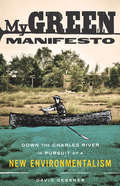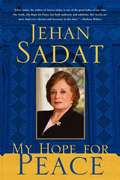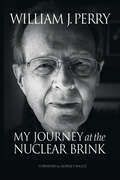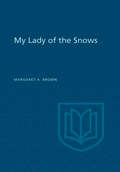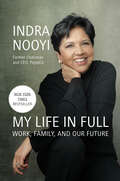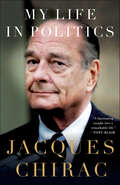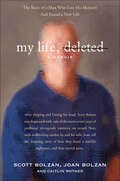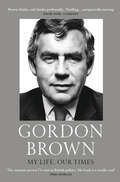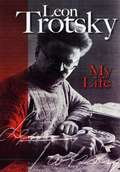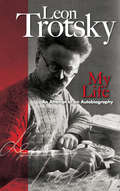- Table View
- List View
My Greek Drama: Life, Love, and One Woman's Olympic Effort to Bring Glory to Her Country
by Gianna AngelopoulosNEW YORK TIMES BESTSELLER WALL STREET JOURNAL BESTSELLER Now with a new foreword by the author celebrating the five-year anniversary of her sweeping, inspiring memoir. The world had doubted Greece's ability to successfully stage the 2004 Olympic Games. In rescuing the Athens Olympics and delivering what IOC President Jacques Rogge called an "unforgettable dream games," Gianna Angelopoulos also delivered a new Greece, a modern can-do nation, a Greece worthy of its illustrious heritage. Little did she know that a few years later her country would abandon the lessons of the Olympics and become embroiled in a political and economic crisis that would devastate Greece and threaten the economic security of Europe. My Greek Drama captures the burning ambition of the rebellious girl from the island of Crete who ''lit'' the Olympic torch. Her story should help rekindle the spirit of the Greek people, and of every person who has ever struggled to change the world.
My Green Manifesto: Down the Charles River in Pursuit of a New Environmentalism
by David GessnerAll environmentalism is local: “A wonderfully readable book” about saving the planet by focusing first on our own habitats (The Boston Globe).Though environmental awareness is on the rise, our march toward ecological collapse continues. What was once a movement based primarily on land preservation, endangered species, and policy reform is now a fractured mess of back-to-the-landers, capitalist “green lifestyle” vendors, technology worshipers, and countless special interest groups.Inspired by a rough-and-tumble journey across country and down river, David Gessner, a John Burroughs Award winner, makes the case for a new environmentalism. In a frank, funny, and incisive call to arms that spans from the Cape Wind Project to the Monkey Wrench Gang, he considers why we do or do not fight to protect and restore wilderness, and reminds us why it’s time to join the fray.Known as an environmental advocate “reminiscent of Edward Abbey” (Library Journal), Gessner rebels against this fragmented environmentalism and holier-than-thou posturing. He also suggests that global problems, though real, are disempowering. While introducing us to lovable, stubborn Dan Driscoll, “a regular guy fighting a local fight for a limited wilderness,” he argues for a movement focused on local issues and grounded in a more basic, more holistic—and ultimately more effective—defense of home.“Funny and inspiring.” —Publishers Weekly (starred review)
My GuantÁnamo Diary: The Detainees and the Stories They Told Me
by Mahvish Rukhsana KhanMahvish Khan is the only Afghan-American to walk into Guantanamo of her own accord. This unique book is her story, and the story of the men she grew to know uniquely well inside the cages of Guantanamo. Mahvish Khan is an American lawyer, born to immigrant Afghan parents. She was outraged that her country, the USA, seemed to have suspended its tradition of equality for all under the law with regard to those imprisoned at Guantanamo Bay in Cuba, and so she volunteered to translate for the lawyers - including British lawyer and founder of Reprieve Clive Stafford Smith - acting pro bono for the prisoners. Because she spoke their language, understood their customs and brought them Starbucks chai, the closest available drink to the kind of tea they would drink at home, they quickly befriended her, offering fatherly advice as well as a uniquely personal insight into their plight, and that of their families thousands of miles away at home. Some at Guantanamo are terrorists who deserve to be convicted and sentenced as such. Some are paediatricians and school teachers. We cannot tell the difference until we see them as individuals with their own unique stories. They deserve that much. No other writer has had access to the detainees. This book is a testament to their captivity. It documents the voices of men who have been tortured and held in a black hole of indefinite detention without legal recourse for years. It shows who they are and also allows readers to see that these men are more similar to us than they are different.
My Havana
by Xenia Reloba de la Cruz Maria Carida Cumana Karen DubinskyFor more than thirty years, musician Carlos Varela has been a guide to the heart, soul, and sound of Havana. One of the best known singer-songwriters to emerge out of the Cuban nueva trova movement, Varela has toured in North America, the Caribbean, Latin America, and Europe. In North America, Varela is "Cuba's Bob Dylan." In Cuba, he is the voice of the generation that came of age in the 1990s and for whom his songs are their generation's anthems. My Havana is a lyrical exploration of Varela's life and work, and of the vibrant musical, literary, and cinematic culture of his generation.Popular both among Cubans on the island and in the diaspora, Varela is legendary for the intense political honesty of lyrics. He is one of the most important musicians in the Cuban scene today. In My Havana, writers living in Canada, Cuba, the United States, and Great Britain use Varela's life and music to explore the history and cultural politics of contemporary Cuba. The book also contains an extended interview with Varela and English translations of the lyrics to all his recorded songs, most of which are appearing in print for the very first time.
My Hijacking: A Personal History of Forgetting and Remembering
by Martha HodesIn this moving and thought-provoking memoir, a historian offers a personal look at the fallibilities of memory and the lingering impact of trauma as she goes back fifty years to tell the story of being a passenger on an airliner hijacked in 1970.On September 6, 1970, twelve-year-old Martha Hodes and her thirteen-year-old sister were flying unaccompanied back to New York City from Israel when their plane was hijacked by members of the Popular Front for the Liberation of Palestine and forced to land in the Jordan desert. Too young to understand the sheer gravity of the Israeli-Palestinian conflict, Martha coped by suppressing her fear and anxiety. Nearly a half-century later, her memories of those six days and nights as a hostage are hazy and scattered. Was it the passage of so much time, or that her family couldn’t endure the full story, or had trauma made her repress such an intense life-and-death experience? A professional historian, Martha wanted to find out.Drawing on deep archival research, childhood memories, and conversations with relatives, friends, and fellow hostages, Martha Hodes sets out to re-create what happened to her, and what it was like for those at home desperately hoping for her return. Thrown together inside a stifling jetliner, the hostages forged friendships, provoked conflicts, and dreamed up distractions. Learning about the lives and causes of their captors—some of them kind, some frightening—the sisters pondered a deadly divide that continues today. A thrilling tale of fear, denial, and empathy, My Hijacking sheds light on the hostage crisis that shocked the world, as the author comes to a deeper understanding of both what happened in the Jordan desert in 1970 and her own fractured family and childhood sorrows.
My Honorable Brother
by Bob WeintraubFor Sal, running for governor was better than death at the mob's hands, if only the sex wouldn't get in the way.Mob head Sal Tarantino doesn't want big-time casino gambling to become legal in Rhode Island. His solution is to have to have the next governor comfortably in his pocket and ready to veto the legislation. The means calling in the debts owed to the mob by some of Rhode Island's most prominent politicians to clear the way for Doug Fiore, managing partner of the state's largest law firm and soon-to-be reluctant gubernatorial candidate.Sal's plan seems to be going smoothly until the primary draws closer, when Fiore's opponent, a supporter of state-sponsored gambling and the leader in the polls, is gunned down in a bar along with the establishment's bookie-in-residence. The public presumption, driven by columns in the Providence Herald in which Fiore's ties to the family are laid out, is that the Tarantino family had reasons to want them both dead. Things get even stickier when the winner of the Democratic primary is the husband of one of Fiore's law partners-who happens to also be one of his two mistresses. She learns with horror that her husband has a set of secret recordings taken in a hotel room where Fiore has met with both women.As the race draws to a close, the candidates are in a dead heat. Fiore, who now will stop at nothing to win, devises a scheme with both his mistresses to nail down his victory. The outcome is all in the sex.
My Honorable Brother: A Thriller
by Bob WeintraubA gritty political thriller in which a race for governor is rocked by sex scandals, mob hits, and one candidate’s blind ambition . . . To stop the legalization of big-time casino gambling in Rhode Island, mob boss Sal Tarantino calls in debts owed by some of the state’s most prominent politicians, clearing the way for reluctant gubernatorial candidate Doug Fiore. But when Fiore’s primary opponent, who’s leading in the polls, is gunned down in a bar, the public presumption is that the Tarantino family had reasons to want him dead. Things get even stickier when the husband of one of Fiore’s mistresses wins the Democratic primary—a man who possesses secret recordings that implicate Fiore in two affairs. As the race draws to a close, the candidates are in a dead heat. Fiore, who now will stop at nothing to win, moves to nail down his victory with an audacious scheme—involving both his mistresses . . .
My Hope for Peace
by Jehan SadatFrom the former First Lady of Egypt, New York Times best-selling author, crusader for women's rights, and widow of the slain Nobel Peace Prize winner Anwar Sadat, comes a timely, clear-eyed examination of the defining issues of the Middle East.teps that will lead to their resolution. With a wit and charm developed over fifty years in the public eye, Mrs. Sadat draws on her personal experiences, from her career as first lady of Egypt to her further and yet greater commitments to peace in her widowhood, to explain plainly and frankly the historical, political, and religious underpinnings of the peace process, which many in the West have yet to understand. Along the way, she outlines the origins of modern Islamic terrorism, something she has confronted both politically and personally; she addresses the attendant misconceptions about her faith; and she debunks many of the myths of Muslim womanhood, not least by displaying the clear-eyed passion and political acumen that have earned her worldwide admiration.
My Husband and I: The Inside Story of 70 Years of the Royal Marriage
by Ingrid SewardWith interest in the royal couple at a new peak thanks to the hit TV series The Crown, Ingrid Seward reveals the real story of the marriage of Queen Elizabeth and Prince Philip. When a young Princess Elizabeth met and fell in love with the dashing Naval Lieutenant Prince Philip of Greece and Denmark, it wasn't without its problems. The romance between the sailor prince and the young princess brought a splash of colour to a nation still in the grip of post-war austerity. When they married in Westminster Abbey in November 1947, there were 3000 guests, including six kings and seven queens. Within five years, as Queen Elizabeth II, she would ascend to the throne and later be crowned in front of millions watching through the new medium of television. Throughout her record-breaking reign, she relied on the formidable partnership she had made with her consort. Now, after 70 years of their marriage, acclaimed royal biographer Ingrid Seward sheds new light on their relationship and its impact on their family and on the nation. In My Husband and I, we discover the challenges faced by Prince Philip as he has had to learn to play second fiddle to the Queen in all their public engagements, but we also get a revealing insight into how their relationship operates behind closed doors. As the years have gone by, there have been rumours of marital troubles, fierce debates over how to bring up their children, and they have had to deal with family traumas - from scandalous divorces to shocking deaths - in the full glare of the public eye. But somehow, their relationship has endured and provided a model of constancy to inspire all around them.This book is not only a vivid portrait of a hugely important marriage, it is a celebration of the power of love.
My Israel Question: Reframing The Israel/Palestine Conflict
by Antony LoewensteinAntony's Loewenstein's My Israel Question was a bestseller when first published and generated a storm of controversy, critical praise and robust public debate. Loewenstein's forensic discussion of the Israeli-Palestinian conflict continues here in a fully updated and expanded new edition, examining the prospects of the Middle East peace process in the new geo-political context. The election of Barack Obama brought hope to millions around the world and has seen renewed diplomatic efforts in the Middle East. Yet the Israel-Palestine conflict remains mired in brutality and occupation. The election of a far-right Israeli government, the indiscriminate war on Gaza and the illegal expansion of West Bank colonies suggest a bleak future for both Israelis and Palestinians. However, public debate about the issue, in the USA, United Kingdom, Europe and Australia, is suggesting alternative ways of tackling the crisis. Now, Antony Loewenstein maps the way in which the conflict is ferociously discussed and where the hope lies for resolution to the brutal impasse.
My Journey at the Nuclear Brink
by William PerryMy Journey at the Nuclear Brink is a continuation of William J. Perry's efforts to keep the world safe from a nuclear catastrophe. It tells the story of his coming of age in the nuclear era, his role in trying to shape and contain it, and how his thinking has changed about the threat these weapons pose. In a remarkable career, Perry has dealt firsthand with the changing nuclear threat. Decades of experience and special access to top-secret knowledge of strategic nuclear options have given Perry a unique, and chilling, vantage point from which to conclude that nuclear weapons endanger our security rather than securing it. This book traces his thought process as he journeys from the Cuban Missile Crisis, to crafting a defense strategy in the Carter Administration to offset the Soviets' numeric superiority in conventional forces, to presiding over the dismantling of more than 8,000 nuclear weapons in the Clinton Administration, and to his creation in 2007, with George Shultz, Sam Nunn, and Henry Kissinger, of the Nuclear Security Project to articulate their vision of a world free from nuclear weapons and to lay out the urgent steps needed to reduce nuclear dangers.
My Journey into the Heart of Terror: Ten Days in the Islamic State
by Jürgen TodenhöferAn alarming and enlightening first-hand account of what's really going on behind the borders of the Islamic State.ISIS, IS, the Islamic State. The name is chilling. The images are horrific. This is a group that beheads journalists-and yet one, the German Jürgen Todenhöfer, went out of his way to get an invitation to visit ISIS fighters in Mosul in 2014 to ask them to explain their beliefs. This book is the result of his conversation. My Journey into the Heart of Terror: Ten Days in the Islamic State shows how the organization grew from its al-Qaeda roots and takes a harsh look at the West's role in its past and today. Along the way, Todenhöfer offers startling insights into what ISIS thinks, what it wants-and what must change if it is to be defeated. Only by understanding, Todenhöfer believes, can we move forward and combat ISIS's radical, violent interpretation of Islam and the terror and destruction it brings.
My Kind of City: Collected Essays of Hank Dittmar
by Hank Dittmar"Hank lived by the credo, ‘first listen, then design'.”—Scott Bernstein, Founder and Chief Strategy + Innovation Officer, Center for Neighborhood Technology Hank Dittmar was a globally recognized urban planner, advocate, and policy advisor. He wrote extensively on a wide range of topics, including architectural criticism, community planning, and transportation policy over his long and storied career. In My Kind of City, Dittmar has organized his selected writings into ten sections with original introductions. His observations range on scale from local ("My Favorite Street: Seven Dials, Covent Garden, London”) to national ("Post Truth Architecture in the Age of Trump”) and global ("Architects are Critical to Adapting our Cities to Climate Change”). Andrés Duany writes of Hank in the book foreword, "He has continued to search for ways to engage place, community and history in order to avoid the tempting formalism of plans.” The range of topics covered in My Kind of City reflects the breadth of Dittmar's experience in working for better cities for people. Common themes emerge in the engaging prose including Dittmar's belief that improving our cities should not be left to the "experts”; his appreciation for the beautiful and the messy; and his rare combination of deep expertise and modesty. As Lynn Richards, CEO of Congress for the New Urbanism expresses in the preface, "Hank's writing is smart without being elitist, witty and poetic, succinct and often surprising.”My Kind of City captures a visionary planner's spirit, eye for beauty, and love for the places where we live.
My Kind of Transit: Rethinking Public Transportation (Center For American Places - My Kind Of ... Ser.)
by Darrin NordahlIn My Kind of Transit, Darrin Nordahl argues that like life itself, transportation isn't only about the destination, but the journey. Public transit reduces traffic and pollution, yet few of us are willing to get out of our cars and onto subways and buses. But Nordahl demonstrates that when using public transit is an enjoyable experience, tourists and commuters alike willingly hand in their keys. The trick is creating a system that isn't simply a poor imitation of the automobile, but offers its own pleasures and comforts. While a railway or bus will never achieve the quiet solitude of a personal car, it can provide, much like a well-designed public park, an inviting, communal space. My Kind of Transit is an animated tour of successful transportation systems, offering smart, commonsense analysis of what makes transit fun. Nordahl draws on examples like the iconic street cars of New Orleans and the picturesque cable cars in San Francisco, illustrating that the best transit systems are uniquely tailored to their individual cities. He also describes universal principles of good transit design. Nordahl's humanistic treatment will help planners, designers, transportation professionals, and policymakers create transit systems the public actually wants to ride. And it will introduce all readers to delightful ways of getting from point A to point B.
My Lady of the Snows
by Douglas Lochhead Margaret A. BrownThis work cannot be fully understood unless the reader is aware of the writer's motives. The book has a twofold meaning -- that of a political novel, and that of the portrayal of a great love and a religious drama. As Disraeli in his novels portrayed the political and social conditions of certain eras of his country, in a simple way this work is intended to portray the conditions existing in Canada at an era when the country was in a state of transition, with the idealistic conception of what the government of a country should be, the conception being based upon a knowledge of the inherent principles of Divine Right and upon Plato's Republic of Justice. The scene is laid prior to the last election during Sir John A. Macdonald's administration. There are no great questions at issue, politics are seen in their lowest form; the protective tariff had been adopted, and with the advent of machinery the old order of things was passing away; the new order had not yet brought any great issues before the people, and the election, commonly called the "Old Flag" election, was run merely on a sentiment of loyalty to the motherland. "My Lady of the Snows" is a woman who has been born "great," and one who has based her life on principles rather than the emotions, or Plato's theory that the emotions should remain subservient to the will.
My Life
by Golda Meir"My Life" by Golda Meir is a compelling autobiography of an amazing woman, from her early days in poverty-stricken Kiev to her tenure as Prime Minister of Israel. This is a frank portrayal of her personality, motivations and goals.
My Life As a Traitor: A Story of Courage and Survival in Tehran's Brutal Evin Prison
by Zarah Ghahramani Robert HillmanAt the age of twenty, an Iranian student named Zarah Ghahramani was swept off the streets of Tehran and taken to the notorious Evin prison, where criminals and political dissidents were held side by side in conditions of legendary brutality. Her crime, she asserts, was in wanting to slide back her headscarf to feel the sun on a few inches of her hair. That modest desire led her to a political activism fueled by the fearless idealism of the young. Her parents begged her to be prudent, but even they could not have imagined the horrors she faced in prison. She underwent psychological and physical torture, hanging on to sanity by scratching messages to fellow prisoners on the latrine door. She fought despair by recalling her idyllic childhood in a sprawling and affectionate family that prized tolerance and freedom of thought. After a show trial, Ghahramani was driven deep into the desert outside Tehran, uncertain if she was to be executed or freed. There she was abandoned to begin the long walk back to reclaim herself. In prose of astonishing dignity and force, Ghahramani recounts the ways in which power seduces and deforms. A richly textured memoir that celebrates a triumph of the individual over the state, My Life as a Traitor is an affecting addition to the literature of struggle and dissent.
My Life as a Foreigner in the 1950s
by Bruno VartuliAs a young man in Italy's Southern Calabria, Bruno Vartuli dreamed of starting a new life in a new land. On his arrival in Australia in the 1950s Bruno struggled to understand the language and culture, but with tremendous strength and perseverance he overcame each adversity and achieved amazing results. This personal story of assimilation and integration highlights the importance of equality in society and inspires us to embrace the differences between people with dignity and compassion.
My Life as a Spy: Investigations in a Secret Police File
by Katherine VerderyAs Katherine Verdery observes, "There's nothing like reading your secret police file to make you wonder who you really are." In 1973 Verdery began her doctoral fieldwork in the Transylvanian region of Romania, ruled at the time by communist dictator Nicolae Ceausescu. She returned several times over the next twenty-five years, during which time the secret police—the Securitate—compiled a massive surveillance file on her. Reading through its 2,781 pages, she learned that she was "actually" a spy, a CIA agent, a Hungarian agitator, and a friend of dissidents: in short, an enemy of Romania. In My Life as a Spy she analyzes her file alongside her original field notes and conversations with Securitate officers. Verdery also talks with some of the informers who were close friends, learning the complex circumstances that led them to report on her, and considers how fieldwork and spying can be easily confused. Part memoir, part detective story, part anthropological analysis, My Life as a Spy offers a personal account of how government surveillance worked during the Cold War and how Verdery experienced living under it.
My Life in Full: Work, Family, and Our Future
by Indra NooyiAn intimate and powerful memoir by the trailblazing former CEO of PepsiCo For a dozen years as one of the world&’s most admired CEOs, Indra Nooyi redefined what it means to be an exceptional leader. The first woman of color and immigrant to run a Fortune 50 company — and one of the foremost strategic thinkers of our time — she transformed PepsiCo with a unique vision, a vigorous pursuit of excellence, and a deep sense of purpose. Now, in a rich memoir brimming with grace, grit, and good humor, My Life in Full offers a firsthand view of Nooyi&’s legendary career and the sacrifices it so often demanded. Nooyi takes us through the events that shaped her, from her childhood and early education in 1960s India, to the Yale School of Management, to her rise as a corporate consultant and strategist who soon ascended into the most senior executive ranks. The book offers an inside look at PepsiCo, and Nooyi&’s thinking as she steered the iconic American company toward healthier products and reinvented its environmental profile, despite resistance at every turn. For the first time and in raw detail, Nooyi also lays bare the difficulties that came with managing her demanding job with a growing family, and what she learned along the way. She makes a clear, actionable, urgent call for business and government to prioritize the care ecosystem, paid leave and work flexibility, and a convincing argument for how improving company and community support for young family builders will unleash the economy&’s full potential. Generous, authoritative, and grounded in lived experience, My Life in Full is the story of an extraordinary leader&’s life, a moving tribute to the relationships that created it, and a blueprint for 21st century prosperity.
My Life in Politics
by Jacques ChiracAlong with Mikhail Gorbachev, Helmut Kohl, and Francois Mitterand, Jacques Chirac is one of the most iconic statesmen of the twentieth century. Two-time president of France, mayor of Paris, and international politician, a recent poll voted him the most admired political figure in France, with current president Nicolas Sarkozy ranking in 32nd place. This memoir covers the full scope of Chirac's political career of more than 50 years and includes the last century's most significant events. A protégé of General de Gaulle, Chirac started political life after France's defeat in Algeria in the early 1960s. He then became Prime Minister George de Pompidou's "bulldozer" and a personal negotiator with Saddam Hussein for France's oil interests in the Persian Gulf. He sold Iraq its first nuclear reactor and incurred the wrath of the United States and Israel, which he discusses in striking detail. As mayor of Paris, Chirac was famed for his success in beautifying the City of Lights and keeping it whole during the heady days of the 1968 riots. As president in the 1990s and early 2000s, Chirac took controversial steps to privatize the economy and plan the European Union. Chirac seldom pulls punches and in several dramatic chapters describes his opposition to the US invasion of Iraq in 2002 and his personal meetings with George W. Bush. These landmark events are brought into sharp focus in this memoir that the popular French magazine Paris Match said "steals the show" even after its author decamped the presidential palace.
My Life, Deleted: A Memoir
by Caitlin Rother Scott Bolzan Joan BolzanMy Life, Deleted—part love story, part medical mystery, and part inspirational memoir—is the true story of Scott Bolzan, the 46-year-old former pro football offensive lineman for the Cleveland Browns who suffered permanent amnesia after a tragic accident.Co-written with his wife Joan Bolzan, this riveting account details Scott's courageous fight to build a new life after losing all memories of his past, his wife and children, his likes and dislikes, and even how to navigate the fast pace and technology of the 21st century.Readers of In an Instant by Bob and Lee Woodruff, Jill Bolte Taylor's My Stroke of Insight, and Richard M. Cohen's Blindsided will be profoundly moved by My Life, Deleted, a remarkable story of tragedy, hope, love, and perseverance.
My Life, Our Times
by Gordon BrownThis revelatory memoir from Britain's former Prime Minister offers vital insights into our extraordinary times.Former Prime Minister and the country's longest-serving Chancellor, Gordon Brown has been a guiding force for Britain and the world over three decades. This is his candid, poignant and deeply relevant story.In describing his upbringing in Scotland as the son of a minister, the near loss of his eyesight as a student and the death of his daughter within days of her birth, he shares the passionately-held principles that have shaped and driven him, reminding us that politics can and should be a calling to serve. Reflecting on the personal and ideological tensions within Labour and its successes and failures in power, he describes how to meet the challenge of pursuing a radical agenda within a credible party of government.From the invasion of Iraq to the tragedy of Afghanistan, from the coalition negotiations of 2010 to the referendums on Scottish independence and Europe, Gordon Brown draws on his unique experiences to explain Britain's current fractured condition. By showing us what progressive politics has achieved in recent decades, he inspires us with a vision of what it might yet achieve.Riveting, expert and highly personal, this historic memoir is an invaluable insight into our times.
My Life: An Attempt at an Autobiography
by Leon TrotskyThe only Bolshevik leader to write his memoirs, Leon Trotsky published this remarkable book in 1930, the first year of a perilous, decade-long exile that ended with his assassination in Mexico. Expelled from the Communist party and deported from the Soviet Union, the former People's Commissar for Foreign Affairs recalled his lifelong struggle in the world of revolutionary politics. In addition to his firsthand accounts of the early intrigues within the Communist government, Trotsky also delivered chilling glimpses into the rise of the new Soviet bureaucracy and prescient warnings of the Stalinist regime's horrors.
My Life: An Attempt at an Autobiography
by Leon TrotskyThe only Bolshevik leader to write his memoirs, Leon Trotsky published this remarkable book in 1930, the first year of a perilous, decade-long exile that ended with his assassination in Mexico. Expelled from the Communist party and deported from the Soviet Union, the former People's Commissar for Foreign Affairs recalled his lifelong struggle in the world of revolutionary politics. In addition to his firsthand accounts of the early intrigues within the Communist government, Trotsky also delivered chilling glimpses into the rise of the new Soviet bureaucracy and prescient warnings of the Stalinist regime's horrors.My Life recounts the rise of the revolutionary wave in Russia in 1905 and 1917, the devastating effects of World War I, and the degeneration of the Russian Revolution from Lenin's internationalist course to Stalin's increasingly counterrevolutionary policies. Trotsky's exile placed him beyond the pale of both the official Communist party and the rest of the political world; yet in this fascinating historical document, he remains true to a philosophy of permanent world revolution, offering a highly informed perspective on the struggle toward a socialist future.

